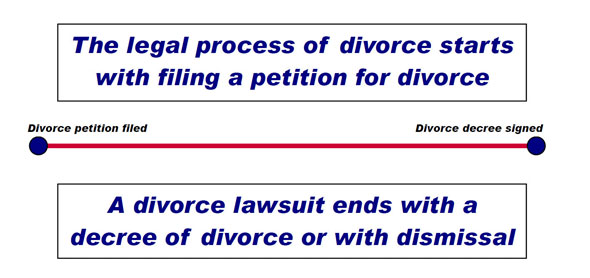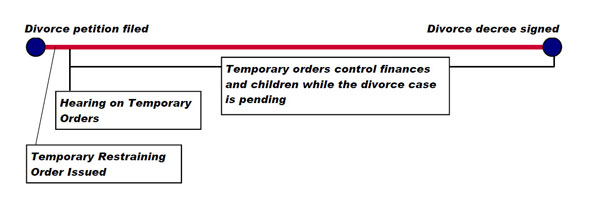Every divorce case begins with the filing of a divorce petition and ends with a divorce decree, which is the final order that grants the divorce. A few divorces end earlier by dismissal because the spouses reconcile and decide not to divorce or because one of the spouses dies. A divorce lawsuit can also be dismissed by the judge if a deadline was not met or people did not show up for court.
A divorce petition by law cannot include detailed factual allegations. The petition lists what the person who filed the suit is asking for and provides information on the dates of marriage and separation and the names and birth dates of the children, if any.
The spouse who files the divorce petition is called the “Petitioner” and usually gets to present evidence first at trial. Sometimes, both spouses file for divorce not knowing the other has done so. In that situation, the cases are combined into the first filed case.
The other spouse who does not file for divorce (or does not filed first), is called the “Respondent.”
Each divorce case that is filed is assigned a cause number (for example, No. 2013-10321 in Harris County or No. 13FD4503 in Galveston County). Each new divorce case is also randomly assigned to a court which handles divorce cases. Each court has an elected judge and an appointed Associate Judge.
The final decree of divorce is the final order that divorces the parties, divides property and address issues related to the children, if there are any.

In Texas, spouses must wait sixty days from the date the divorce petition is filed until the date the divorce can be granted. This waiting period can be waived in very rare situations. Nothing automatically happens after a divorce petition has been on file for sixty days, but a divorce that is agreed and uncontested can be finalized as early as the 61st day. A divorce case that is not settled can be pending for six to nine months and sometimes over a year before it is resolved by a trial.
A uncontested, agreed divorce can be finished quickly and is certainly the cheapest way to get divorced. Click here to learn more about uncontested divorces.
Most divorce cases eventually settle instead of being decided by a trial. However, it can often take a while for the spouses to cool down and think rationally and it may be necessary to obtain financial documents in order to know exactly what there is to divide.
A contested divorce case usually follows these stages:
- Almost as soon as the divorce petition is filed, the court automatically issues a Temporary Restraining Order (TRO) that applies to both the husband and the wife. The TRO, for example, orders the spouses not to hide the children, destroy or give away property and not to keep the other out of the house. The TRO is designed to preserve the status quo until there is a hearing but the TRO does not award custody of children or throw either spouse out of the house. Click here to see a sample TRO.
- A hearing is held in the first few weeks of the case to determine temporary orders. Temporary orders are in force while the divorce case is pending. Temporary orders address who lives in the house and who must move out, who pays which bills, and whether there is temporary spousal support. Spouses must exchange prior to this temporary orders hearing proof of their income in the form of tax returns and pay stubs. If the divorce case involves children, the temporary orders decide which parent has temporary custody, what the visitation schedule will be and how much child support will be paid. Many of the issues at the temporary orders hearing are financial in nature, so both spouses are required to submit Financial Information Statements that summarize their income and expenses and ready cash available to them. Click here to see a sample Financial Information Statement used at these hearings.

- Once the spouses are living apart and the temporary financial and child custody arrangements are determined, things usually calm down and the family gets used to a new way of living.
- The next phase in a divorce case involves sharing and obtaining financial information needed to determine what is community property and what is separate property. The lawyers will usually send each other discovery requests, such as Request for Production (list of documents to provide), Request for Disclosure (asking for witnesses and legal theories) and Interrogatories (written questions that must be answered under oath). Some more complex divorce cases require expert witnesses such as accountants to review financial records and determine what a business is worth or where inherited separate property went. One side or both may hire a real estate appraiser to determine the fair market value of real estate.
- Some spouses will not respond to discovery requests and some will not produce all of the documents that are requested. Some attorneys ask for a lot more information or documents than they are entitled to. Arguments over discovery very often result in motions to compel discovery that must be decided by the judge. If a spouse fails or refuses to respond to proper discovery requests, the judge will usually order that spouse to provide the information and pay the other side’s attorney’s fees incurred in bringing the motion.
- The parties will be required to exchange Sworn Inventories and Appraisals which list assets and debts. Click here to see a sample divorce inventory and proposed property division.
- The attorneys will usually send each other written settlement offers and counter-offers. If this negotiation does not get the case settled, then the courts require the parties to attend mediation prior to a trial. A mediator is a trained professional (almost always a lawyer) who meets with both sides and goes back and forth to communicate settlement proposals. In most mediations, the wife and her lawyer are in one room and down the hall the husband and his lawyer are in another room. They usually do not meet all together and the mediator goes back and forth between their rooms with offers, information and questions. Mediation usually settles over 90% of cases.
- Some divorces unfortunately involve crazy behavior or constant disagreements over the children and those cases can go before the judge for hearings and motions many times while the divorce case is pending. If the parents are fighting over child custody, the judge may appoint a separate attorney for the children, called an Amicus Attorney (which requires the parents to also share the cost of that third attorney). Sometimes, a psychologist is appointed by the judge to be a custody evaluator.
- Divorce cases that are not settled get decided in a trial. The parties can settle on some issues and just submit the contested questions to the judge. In Texas (unlike any other place on Earth), a jury can decide some divorce issues, such as: (1) which parent gets primary custody, (2) how much a piece of property is worth, or (3) whether an item of property is separate or community property. The judge, however, decides the fine details of every divorce, such as how community property is divided and what the specifics of child visitation or support will be.
- Once a divorce case is settled or decided by trial, a Final Decree of Divorce is prepared by one of the lawyers. If the attorneys argue about the wording of the order, there is an “Entry” hearing so that the judge can decide which language to use.
- Once the divorce decree is signed by the judge, it is final after 30 days (unless it is appealed). Most people need official, certified copies of their divorce decree, which costs $1 per page.
- Other documents may also be necessary to finalize a divorce, such as deeds to transfer ownership in land or houses, powers of attorney to transfer ownership of automobiles or boats, and specialized orders that divide retirement accounts, called Qualified Domestic Relations Orders. Women who change their names after divorce must take a certified copy of their divorce decree to the Social Security Office, Driver’s License Office and Passport office to change their names on official government records.
If you’re looking for an experienced Galveston Divorce Lawyer, turn to Enos Family Law.